Library
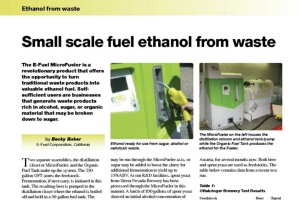 IBD Membership Required
IBD Membership Required
Small scale fuel ethanol from waste
By: Becky Baker
01/05/2010
The E-Fuel MicroFueler is a revolutionary product that offers the opportunity to turn traditional waste products into valuable ethanol fuel. Self sufficient users are businesses that generate waste products rich in alcohol, sugar, or organic material that may be broken down to sugar.
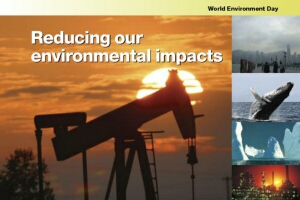 IBD Membership Required
IBD Membership Required
Reducing our environmental impacts
By: Eric Candy
01/05/2010
The brewing and distilling industry has been committed to improving its environmental impact for many decades as discussed in more detail in David Sheen’s article in this issue. As the low hanging fruit of the easier savings have been achieved then continued reductions will become less easy – yet they still need to be achieved.
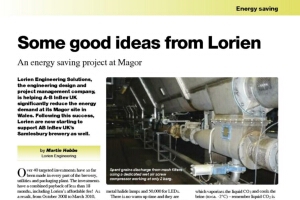 IBD Membership Required
IBD Membership Required
Some good ideas from Lorien - An energy saving project atMagor
By: Martin Hobbs
01/05/2010
Lorien Engineering Solutions, the engineering design and project management company, is helping A-B InBev UK significantly reduce the energy demand at its Magor site in Wales. Following this success, Lorien are now starting to support AB InBev UK’s Samlesbury brewery as well.
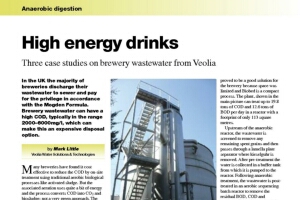 IBD Membership Required
IBD Membership Required
High energy drinks - Three case studies on brewery wastewater from Veolia
By: Mark Little
01/05/2010
In the UK the majority of breweries discharge their wastewater to sewer and pay for the privilege in accordance with the Mogden Formula. Brewery wastewater can have a high COD, typically in the range 2000–6000mg/l, which can make this an expensive disposal option.
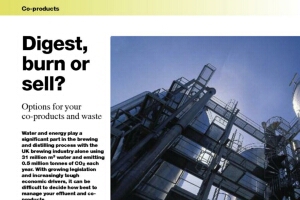 IBD Membership Required
IBD Membership Required
Digest, burn or sell? Options for your co-products and waste
By: Nick Simpson, Vinod Ramachandran
01/05/2010
Water and energy play a significant part in the brewing and distilling process with the UK brewing industry alone using 31 million m3 water and emitting 0.5 million tonnes of CO2 each year. With growing legislation and increasingly tough economic drivers, it can be difficult to decide how best to manage your effluent and coproducts.
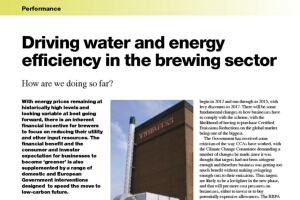 IBD Membership Required
IBD Membership Required
Driving water and energy efficiency in the brewing sector
By: David Sheen
01/05/2010
With energy prices remaining at historically high levels and looking variable at best going forward, there is an inherent financial incentive for brewers to focus on reducing their utility and other input resources. The financial benefit and the consumer and investor expectation for businesses to become ‘greener’ is also supplemented by a range of domestic and European Government interventions designed to speed the move to low-carbon future.
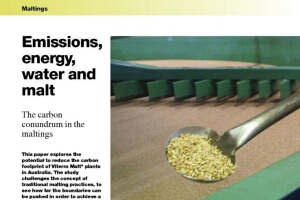 IBD Membership Required
IBD Membership Required
Emissions, energy, water and malt: The carbon conundrum in the maltings
By: Doug Stewart
01/05/2010
This paper explores the potential to reduce the carbon footprint of Viterra Malt* plants in Australia. The study challenges the concept of traditional malting practices, to see how far the boundaries can be pushed in order to achieve a meaningful reduction in energy usage. The most readily achievable means of decreasing the carbon footprint of the malting process is increasing the final malt moisture to at least 6 or 7%.
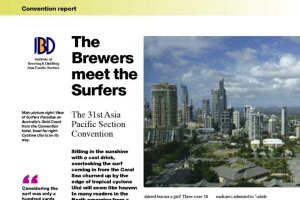 IBD Membership Required
IBD Membership Required
The Brewers meet the Surfers: The 31st Asia Pacific Section Convention
By: Roger Putman
01/05/2010
Sitting in the sunshine with a cool drink, overlooking the surf coming in from the Coral Sea churned up by the edge of tropical cyclone Ului will seem like heaven to many readers in the North emerging from a cold winter. The 31st Convention of the Asia Pacific Section is just over so now I have to ‘sing for my supper’ and thoughts turn to writing it up.
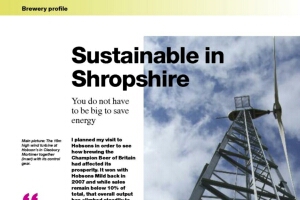 IBD Membership Required
IBD Membership Required
Sustainable in Shropshire
By: Roger Putman
01/05/2010
I planned my visit to Hobsons in order to see how brewing the Champion Beer of Britain had affected its prosperity. It won with Hobsons Mild back in 2007 and while sales remain below 10% of total, that overall output has climbed steadily to reach an all time peak of 180brl in the August Bank Holiday week last year. I found a wind turbine and a ground heat source system which you might expect to be the preserve of brewers producing a lot more than 12,000hl a year.
 IBD Membership Required
IBD Membership Required
Bateman goes for MBR - ACWA MEMTREAT wastewater treatment atWainfleet
By: Gary Harris, Martin Cullimore
01/05/2010
Family owned brewery George Bateman & Son had been aware for sometime that the existing aerobic bio-tower arrangement for treating trade effluent was working beyond its design capacity and were looking for replacement technology.
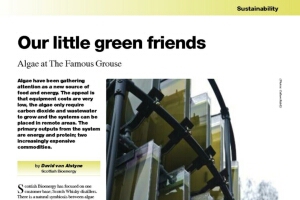 IBD Membership Required
IBD Membership Required
Our little green friends - Algae at The Famous Grouse
01/05/2010
Algae have been gathering attention as a new source of food and energy. The appeal is that equipment costs are very low, the algae only require carbon dioxide and wastewater to grow and the systems can be placed in remote areas. The primary outputs from the system are energy and protein; two increasingly expensive commodities.
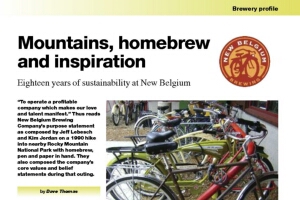 IBD Membership Required
IBD Membership Required
Mountains, homebrew and inspiration - Eighteen years of sustainability at New Belgium
By: Dave Thomas
01/05/2010
“To operate a profitable company which makes our love and talent manifest.” Thus reads New Belgium Brewing Company’s purpose statement as composed by Jeff Lebesch and Kim Jordan on a 1990 hike into nearby Rocky Mountain National Park with homebrew, pen and paper in hand. They also composed the company’s core values and belief statements during that outing.
Some of the content requires an active membership to view.
You can find out more here
Some of the content requires an active membership to view.
You can find out more here
